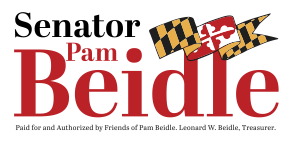I have been a small business owner for over 40 years, and I understand the issues and the rewards of owning a business. In 2019, I had the honor of being appointed by the Senate President to serve on the Advisory Council on the Impact of Regulations on Small Business. Small business is 70% of the Maryland economy, it is vitally important that we help our small businesses stay strong and successful.
Many of our minority businesses are also small businesses and can get assistance through our Small, Minority, & Women Business Affairs office. Maryland's Minority Business Enterprise (MBE) regulations require state agencies to structure their procurements to achieve an overall goal of 29% of the total dollar value of their procurement contracts directly or indirectly from certified Minority Business Enterprises.
Since COVID appeared in March of 2020, small businesses have struggled to stay in business. One of the problems small businesses face was brought to light in 2021 when a tornado tore thru the Annapolis area. The Anne Arundel Senate Delegation supported SB 310 to study how we can help small businesses that are the victims of a natural disaster. This included:
- Expanding the eligible use of grants to businesses and nonprofit organizations in Anne Arundel County and the City of Annapolis when a local state of emergency is declared by the principal executive officer.
- Establishing a Workgroup to Study the Establishment of a State Disaster Relief Fund to study and report its recommendations regarding the efficacy and sustainability of existing emergency fund sources and the potential establishment of a State Disaster Relief Fund.
In 2022, three other bills to assist small businesses were passed:
- SB 487, establishes the position of Minority Business Enterprise (MBE) Ombudsman within the Governor’s Office of Small, Minority, and Women Business Affairs (GOSBA); expands accountability, transparency, and training requirements for the MBE program.
- SB 644, requires the Department of General Services, in consultation with the Governor’s Office of Small, Minority, and Women Business Affairs to study the feasibility and impacts of establishing a state procurement preference for businesses located in historically under-utilized business zones. This preference will help small businesses and the surrounding area.
- I participated in a workgroup concerning SB632/HB709, which requires the Health Benefits Exchange to convene a workgroup to study and recommend solutions for the cost of small group health insurance. Small companies are paying more for each employee in the group than individuals are paying. Individuals are receiving subsidies, while small group employers are paying an additional assessment. The workgroup will continue to study this issue over the interim and find solutions for the cost of small group health insurance.
I am always happy to hear from the small businesses in my district and provide assistance whenever possible.

